Environmental of the World System: Seminar Papers and Analysis
VerifiedAdded on 2021/02/19
|6
|963
|68
Report
AI Summary
This report presents an analysis of environmental issues through the framework of world system theory, examining topics such as deforestation, the impact of capitalism, and global inequality. The report begins by exploring how the world system affects environmental conditions, particularly in semi-peripheral countries. It then delves into the applicability of world system theory in explaining environmental history, highlighting its strengths and limitations in addressing issues like global warming. Finally, the report investigates the relationship between capitalism and environmental conservation, discussing the inherent conflict between economic growth and environmental protection. The analysis draws upon academic sources to provide a comprehensive overview of these critical environmental challenges within the context of the global economic system.
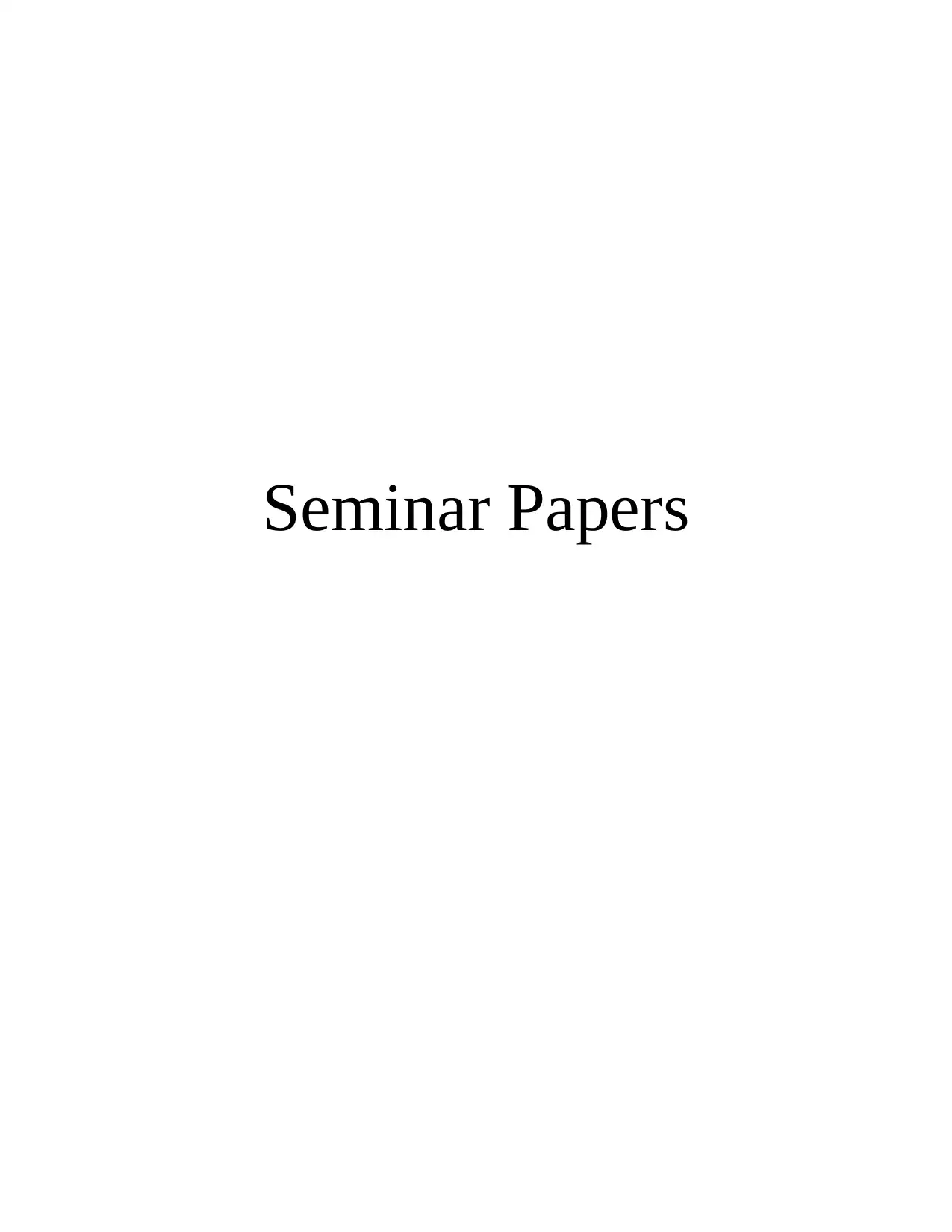
Seminar Papers
Paraphrase This Document
Need a fresh take? Get an instant paraphrase of this document with our AI Paraphraser
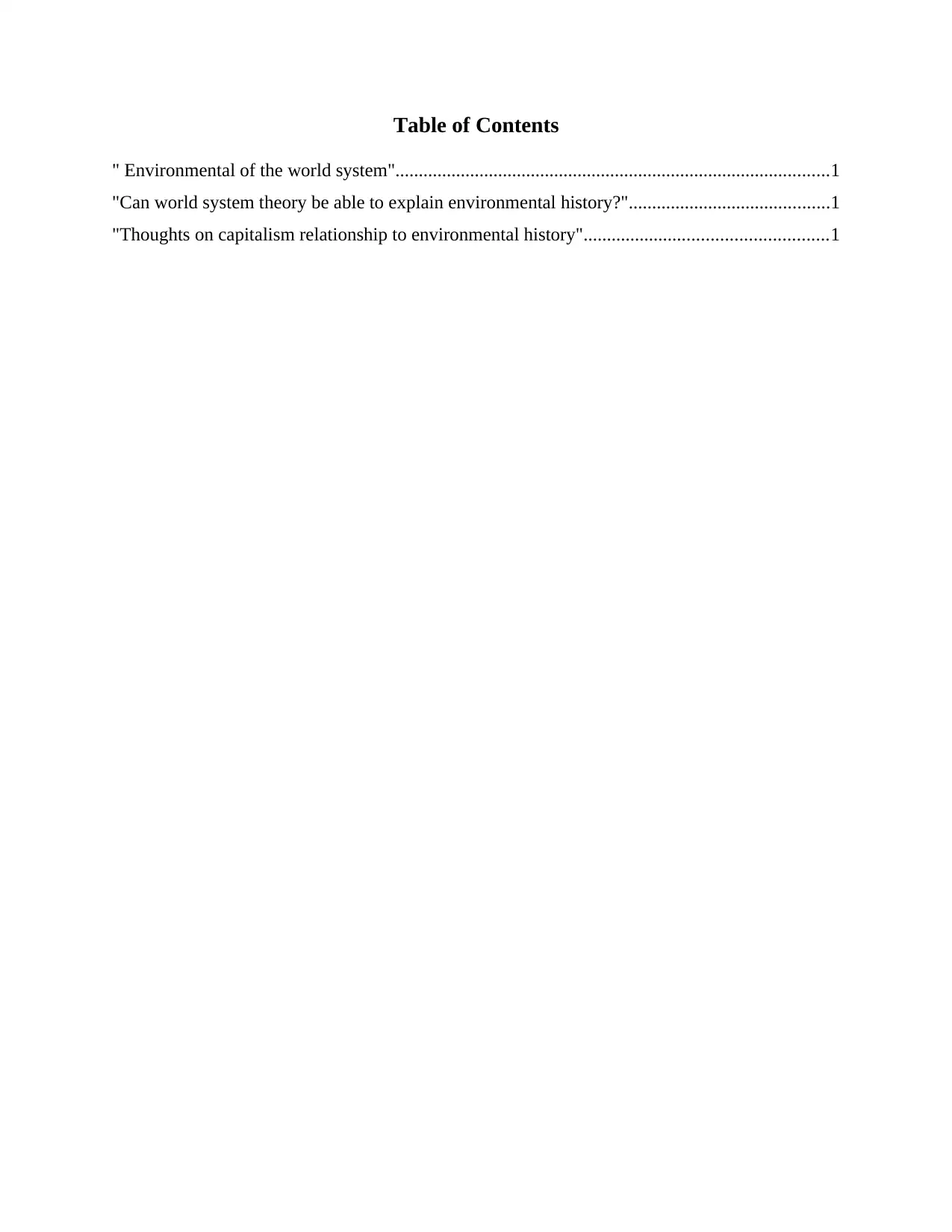
Table of Contents
" Environmental of the world system".............................................................................................1
"Can world system theory be able to explain environmental history?"...........................................1
"Thoughts on capitalism relationship to environmental history"....................................................1
" Environmental of the world system".............................................................................................1
"Can world system theory be able to explain environmental history?"...........................................1
"Thoughts on capitalism relationship to environmental history"....................................................1

⊘ This is a preview!⊘
Do you want full access?
Subscribe today to unlock all pages.

Trusted by 1+ million students worldwide
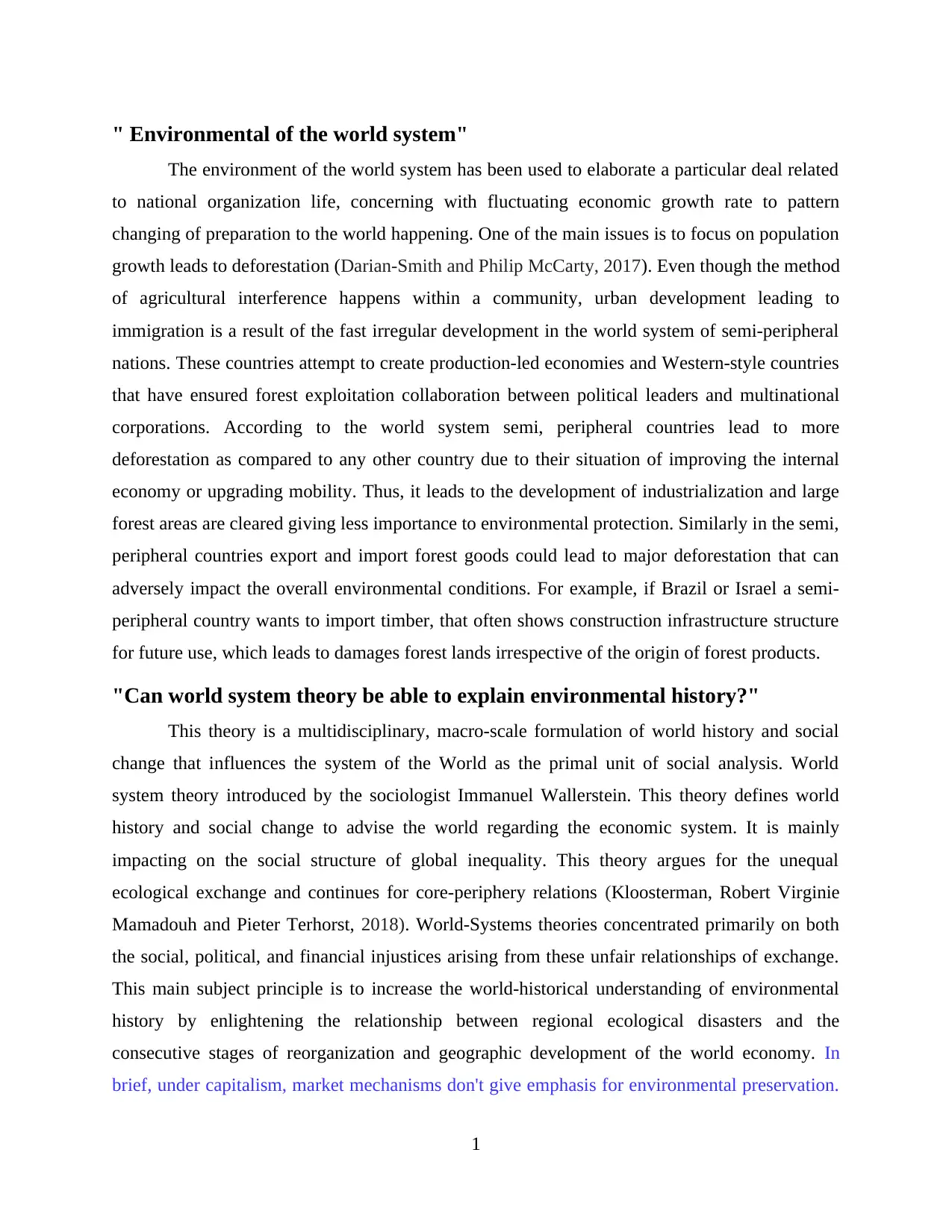
" Environmental of the world system"
The environment of the world system has been used to elaborate a particular deal related
to national organization life, concerning with fluctuating economic growth rate to pattern
changing of preparation to the world happening. One of the main issues is to focus on population
growth leads to deforestation (Darian-Smith and Philip McCarty, 2017). Even though the method
of agricultural interference happens within a community, urban development leading to
immigration is a result of the fast irregular development in the world system of semi-peripheral
nations. These countries attempt to create production-led economies and Western-style countries
that have ensured forest exploitation collaboration between political leaders and multinational
corporations. According to the world system semi, peripheral countries lead to more
deforestation as compared to any other country due to their situation of improving the internal
economy or upgrading mobility. Thus, it leads to the development of industrialization and large
forest areas are cleared giving less importance to environmental protection. Similarly in the semi,
peripheral countries export and import forest goods could lead to major deforestation that can
adversely impact the overall environmental conditions. For example, if Brazil or Israel a semi-
peripheral country wants to import timber, that often shows construction infrastructure structure
for future use, which leads to damages forest lands irrespective of the origin of forest products.
"Can world system theory be able to explain environmental history?"
This theory is a multidisciplinary, macro-scale formulation of world history and social
change that influences the system of the World as the primal unit of social analysis. World
system theory introduced by the sociologist Immanuel Wallerstein. This theory defines world
history and social change to advise the world regarding the economic system. It is mainly
impacting on the social structure of global inequality. This theory argues for the unequal
ecological exchange and continues for core-periphery relations (Kloosterman, Robert Virginie
Mamadouh and Pieter Terhorst, 2018). World-Systems theories concentrated primarily on both
the social, political, and financial injustices arising from these unfair relationships of exchange.
This main subject principle is to increase the world-historical understanding of environmental
history by enlightening the relationship between regional ecological disasters and the
consecutive stages of reorganization and geographic development of the world economy. In
brief, under capitalism, market mechanisms don't give emphasis for environmental preservation.
1
The environment of the world system has been used to elaborate a particular deal related
to national organization life, concerning with fluctuating economic growth rate to pattern
changing of preparation to the world happening. One of the main issues is to focus on population
growth leads to deforestation (Darian-Smith and Philip McCarty, 2017). Even though the method
of agricultural interference happens within a community, urban development leading to
immigration is a result of the fast irregular development in the world system of semi-peripheral
nations. These countries attempt to create production-led economies and Western-style countries
that have ensured forest exploitation collaboration between political leaders and multinational
corporations. According to the world system semi, peripheral countries lead to more
deforestation as compared to any other country due to their situation of improving the internal
economy or upgrading mobility. Thus, it leads to the development of industrialization and large
forest areas are cleared giving less importance to environmental protection. Similarly in the semi,
peripheral countries export and import forest goods could lead to major deforestation that can
adversely impact the overall environmental conditions. For example, if Brazil or Israel a semi-
peripheral country wants to import timber, that often shows construction infrastructure structure
for future use, which leads to damages forest lands irrespective of the origin of forest products.
"Can world system theory be able to explain environmental history?"
This theory is a multidisciplinary, macro-scale formulation of world history and social
change that influences the system of the World as the primal unit of social analysis. World
system theory introduced by the sociologist Immanuel Wallerstein. This theory defines world
history and social change to advise the world regarding the economic system. It is mainly
impacting on the social structure of global inequality. This theory argues for the unequal
ecological exchange and continues for core-periphery relations (Kloosterman, Robert Virginie
Mamadouh and Pieter Terhorst, 2018). World-Systems theories concentrated primarily on both
the social, political, and financial injustices arising from these unfair relationships of exchange.
This main subject principle is to increase the world-historical understanding of environmental
history by enlightening the relationship between regional ecological disasters and the
consecutive stages of reorganization and geographic development of the world economy. In
brief, under capitalism, market mechanisms don't give emphasis for environmental preservation.
1
Paraphrase This Document
Need a fresh take? Get an instant paraphrase of this document with our AI Paraphraser
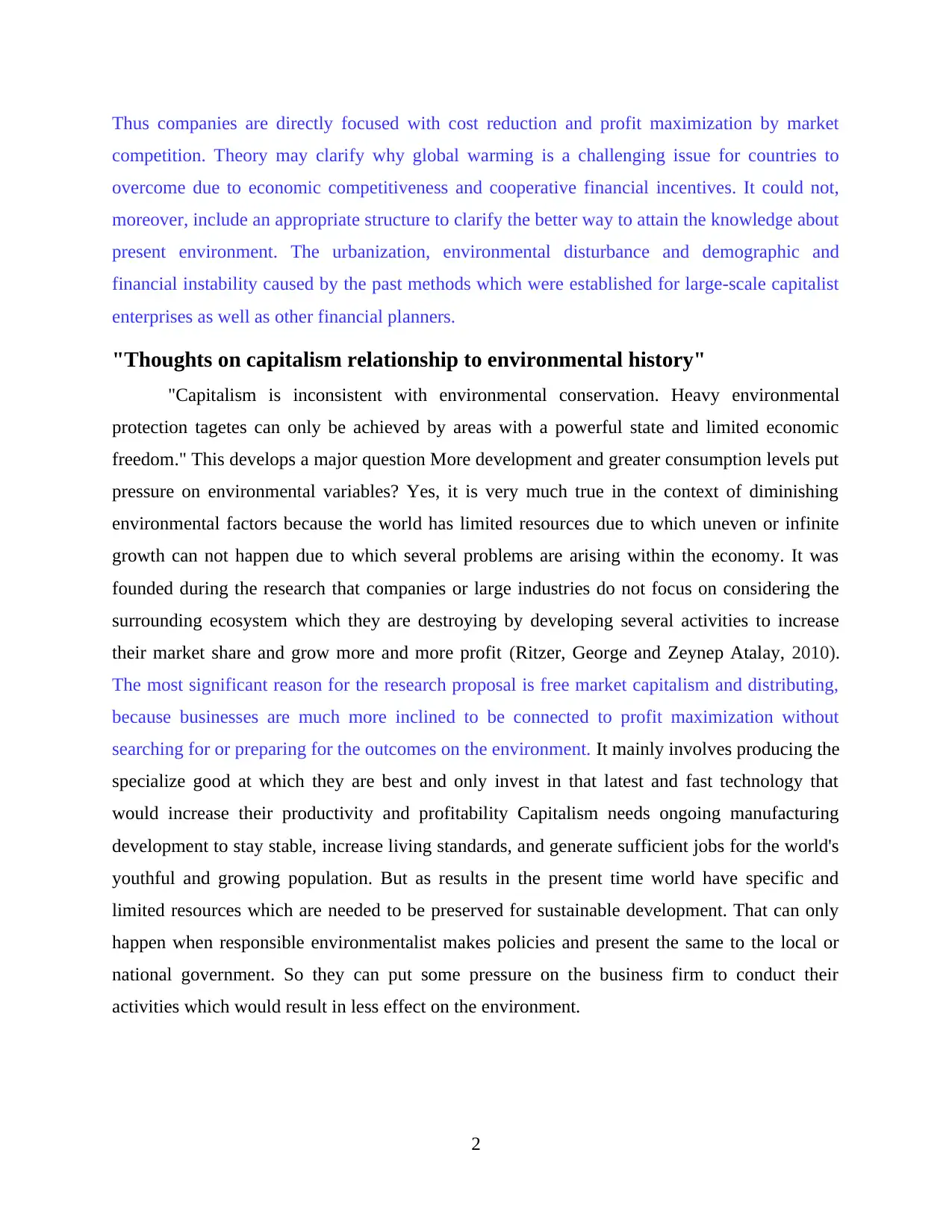
Thus companies are directly focused with cost reduction and profit maximization by market
competition. Theory may clarify why global warming is a challenging issue for countries to
overcome due to economic competitiveness and cooperative financial incentives. It could not,
moreover, include an appropriate structure to clarify the better way to attain the knowledge about
present environment. The urbanization, environmental disturbance and demographic and
financial instability caused by the past methods which were established for large-scale capitalist
enterprises as well as other financial planners.
"Thoughts on capitalism relationship to environmental history"
"Capitalism is inconsistent with environmental conservation. Heavy environmental
protection tagetes can only be achieved by areas with a powerful state and limited economic
freedom." This develops a major question More development and greater consumption levels put
pressure on environmental variables? Yes, it is very much true in the context of diminishing
environmental factors because the world has limited resources due to which uneven or infinite
growth can not happen due to which several problems are arising within the economy. It was
founded during the research that companies or large industries do not focus on considering the
surrounding ecosystem which they are destroying by developing several activities to increase
their market share and grow more and more profit (Ritzer, George and Zeynep Atalay, 2010).
The most significant reason for the research proposal is free market capitalism and distributing,
because businesses are much more inclined to be connected to profit maximization without
searching for or preparing for the outcomes on the environment. It mainly involves producing the
specialize good at which they are best and only invest in that latest and fast technology that
would increase their productivity and profitability Capitalism needs ongoing manufacturing
development to stay stable, increase living standards, and generate sufficient jobs for the world's
youthful and growing population. But as results in the present time world have specific and
limited resources which are needed to be preserved for sustainable development. That can only
happen when responsible environmentalist makes policies and present the same to the local or
national government. So they can put some pressure on the business firm to conduct their
activities which would result in less effect on the environment.
2
competition. Theory may clarify why global warming is a challenging issue for countries to
overcome due to economic competitiveness and cooperative financial incentives. It could not,
moreover, include an appropriate structure to clarify the better way to attain the knowledge about
present environment. The urbanization, environmental disturbance and demographic and
financial instability caused by the past methods which were established for large-scale capitalist
enterprises as well as other financial planners.
"Thoughts on capitalism relationship to environmental history"
"Capitalism is inconsistent with environmental conservation. Heavy environmental
protection tagetes can only be achieved by areas with a powerful state and limited economic
freedom." This develops a major question More development and greater consumption levels put
pressure on environmental variables? Yes, it is very much true in the context of diminishing
environmental factors because the world has limited resources due to which uneven or infinite
growth can not happen due to which several problems are arising within the economy. It was
founded during the research that companies or large industries do not focus on considering the
surrounding ecosystem which they are destroying by developing several activities to increase
their market share and grow more and more profit (Ritzer, George and Zeynep Atalay, 2010).
The most significant reason for the research proposal is free market capitalism and distributing,
because businesses are much more inclined to be connected to profit maximization without
searching for or preparing for the outcomes on the environment. It mainly involves producing the
specialize good at which they are best and only invest in that latest and fast technology that
would increase their productivity and profitability Capitalism needs ongoing manufacturing
development to stay stable, increase living standards, and generate sufficient jobs for the world's
youthful and growing population. But as results in the present time world have specific and
limited resources which are needed to be preserved for sustainable development. That can only
happen when responsible environmentalist makes policies and present the same to the local or
national government. So they can put some pressure on the business firm to conduct their
activities which would result in less effect on the environment.
2
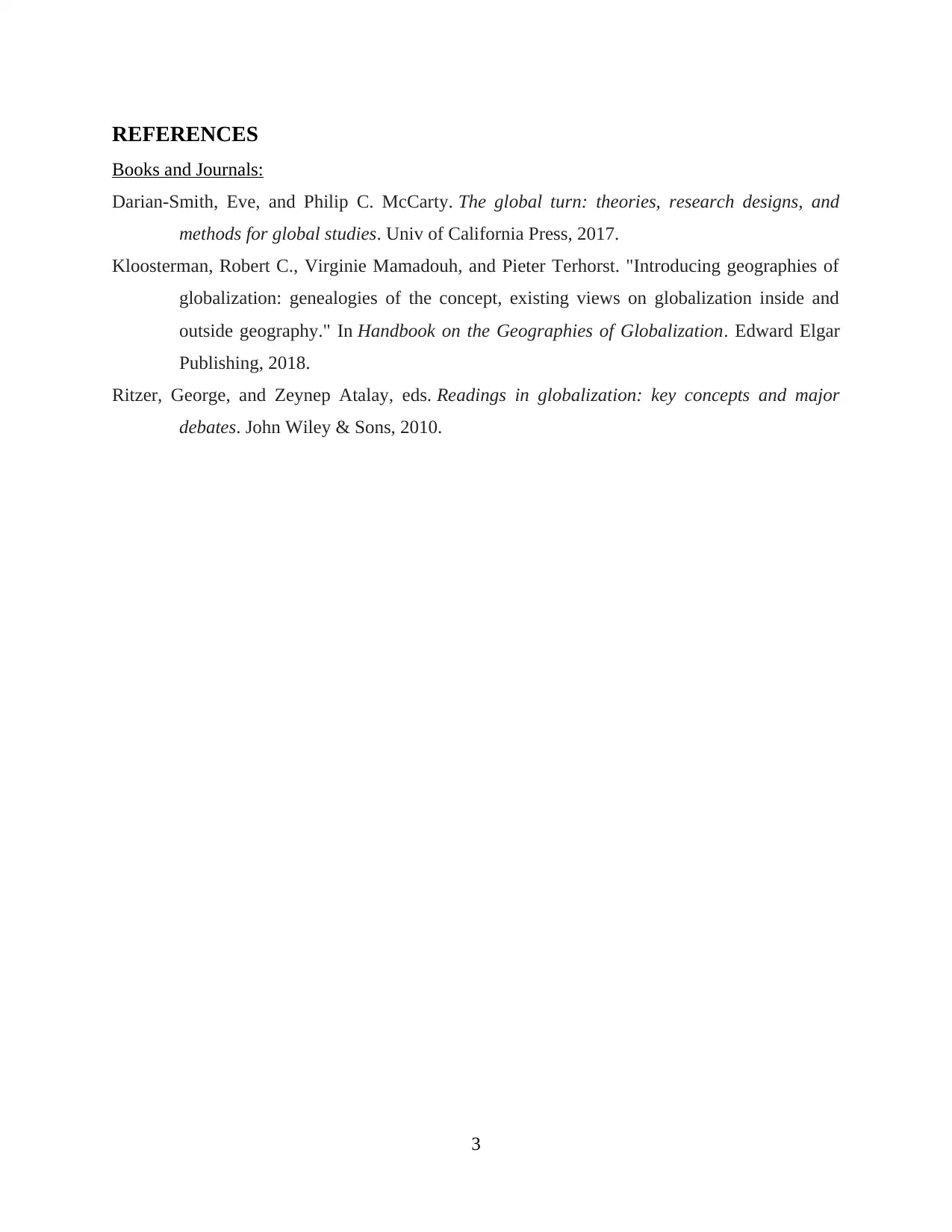
REFERENCES
Books and Journals:
Darian-Smith, Eve, and Philip C. McCarty. The global turn: theories, research designs, and
methods for global studies. Univ of California Press, 2017.
Kloosterman, Robert C., Virginie Mamadouh, and Pieter Terhorst. "Introducing geographies of
globalization: genealogies of the concept, existing views on globalization inside and
outside geography." In Handbook on the Geographies of Globalization. Edward Elgar
Publishing, 2018.
Ritzer, George, and Zeynep Atalay, eds. Readings in globalization: key concepts and major
debates. John Wiley & Sons, 2010.
3
Books and Journals:
Darian-Smith, Eve, and Philip C. McCarty. The global turn: theories, research designs, and
methods for global studies. Univ of California Press, 2017.
Kloosterman, Robert C., Virginie Mamadouh, and Pieter Terhorst. "Introducing geographies of
globalization: genealogies of the concept, existing views on globalization inside and
outside geography." In Handbook on the Geographies of Globalization. Edward Elgar
Publishing, 2018.
Ritzer, George, and Zeynep Atalay, eds. Readings in globalization: key concepts and major
debates. John Wiley & Sons, 2010.
3
⊘ This is a preview!⊘
Do you want full access?
Subscribe today to unlock all pages.

Trusted by 1+ million students worldwide
1 out of 6
Related Documents
Your All-in-One AI-Powered Toolkit for Academic Success.
+13062052269
info@desklib.com
Available 24*7 on WhatsApp / Email
![[object Object]](/_next/static/media/star-bottom.7253800d.svg)
Unlock your academic potential
Copyright © 2020–2026 A2Z Services. All Rights Reserved. Developed and managed by ZUCOL.





